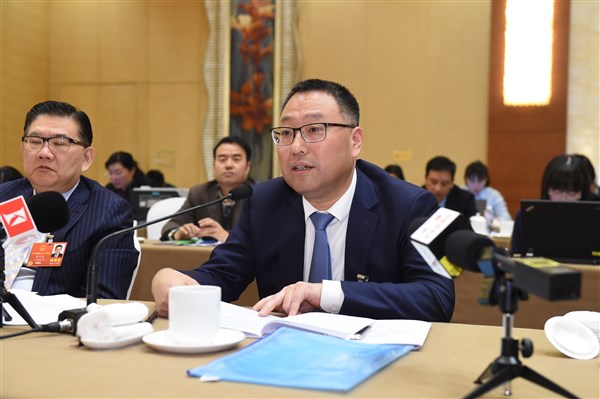
今日上海
普陀将优化改善营商环境 - 2018年04月08日
District pledge to serve business evolution

PUTUO District’s top official has pledged to better serve companies and optimize its business environment at the National People’s Congress in Beijing.
Cao Liqiang, the Party secretary of Putuo said the district government must let the companies feel convenient, help them solve problems more efficiently and offer them the best services.
“District governments should serve as the ‘servant’ to immediately respond to the companies’ demands, solve their difficulties and help their development,” Cao said at the congress which ended on March 20.
He said the government should use its power to drive the vitality of the market, while civil servants should strive for the happiness of the people and development of the companies.
Putuo has made “optimizing business environment” one of its top tasks this year to lure more multinational enterprises, industrial leaders and leading startups to make a base in the district.
It has released a series of new industrial policies, including Shanghai’s first “one-stop integrated service platform” for companies, to cover enterprise services, technological innovation, talent training and industrial development, which are key to the development of enterprises.
The government aims to visit all the Putuo-based enterprises during its Big Analysis campaign this year, which are not only to identify the concerns of citizens, but also to improve the general environment for doing business.
The government has so far discussed almost 600 issues, problems or obstacles to overcome during its talks with the companies, mainly on administrative approval, talent services, government support, nearby facilities and guides on businesses, investments and information gathering.
The Putuo government will reduce the number of issues that requires approval from the district government.
According to its plan, the district-level issues for companies requires no approval by June.
The government’s approval process will also be speeded up. The approval for some industrial projects, for instance, has been cut to the minimum of 15 work days from the previous 3 months. The registration process for newly established enterprises will also be simplified.
As a highlight, the Putuo government has launched the first integrated “one-stop service station” for new enterprises in Shanghai with the combination of its existing online service platform and district’s administrative service hall.
The companies’ staff only need to come to the service hall once to complete the necessary application procedures and finish other processes online. However, the government will enhance the in-process and the afterwards oversight, especially for newly emerged industries.
The district government will also optimize its policies to better serve businesses and industries. It has launched three inclusive policies to benefit all the Putuo-registered enterprises on company services, technological innovation and talent development.
Five industrial policies will support the key industries of the district, including finance, culture, professional services, intellectual manufacturing and robotics, as well as online gaming.
The government will improve communications with companies, especially those private enterprises. More than half of the Putuo companies are in the private sector, the largest proportion in the city.
The government will also invite company officials, citizens and third party institutes to evaluate the government’s services constantly.
The district will strive to better serve professionals working and living in Putuo. The government will help better accommodate and serve professionals, especially on medical services and children’s schooling to help them achieve in Putuo.
“Putuo is on the key process to transit and upgrade, so it is urgent for the government to change its position to relieve the burden on the companies, vitalize the market and nurture the new drives to economic development,” Cao said.
As a national legislator, Cao proposed to emphasize on the construction of the rule of law in the field of social governance. He suggested to refine and solidify the good experiences and practices of social governance innovations in various places to form an effective guarantee of the rule of law, and truly integrate social governance into the legal system.
He also proposed to make policies at the national level to improve the training and incentive mechanism for social workers to build a high-quality professional team.

